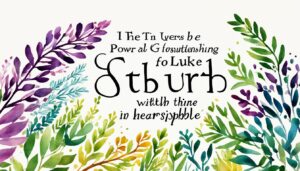
Nature In The Bible: Welcome to an exploration of the Bible’s teachings on nature and the significance it holds in our lives. As I delve into various verses, we will see how the scriptures emphasize the importance of cherishing God’s creation and finding spiritual solace in the beauty of nature. Nature’s future restoration and renewal parallel the redemption of humanity, offering hope for both creation and our spiritual selves. These verses will guide us in understanding our role as stewards of the Earth and the profound lessons we can learn from the natural world.
Key Takeaways:
- God’s creation is excellent and beautiful, and the Bible encourages us to admire and reflect on His planned design.
Nature demonstrates God’s power, creativity, and authority.
We thank and glorify God through nature, recognizing His greatness and majesty in all creation.
As good stewards, humans must protect God’s creation.
We can learn from nature’s miracles about simplicity, trust, and following God’s precepts.
The Goodness of God’s Creation
When we look at the world around us, it is easy to be captivated by the beauty and intricacy of nature. The Bible also calls us stewards of creation, entrusting us to protect nature. Nature’s future restoration and renewal parallel the redemption of humanity, offering hope for both creation and our spiritual selves. The Bible provides us with verses that highlight the goodness of God’s creation, inviting us to reflect on His handiwork and appreciate the wonders that surround us. Genesis 1:9-10 and Genesis 1:11-12 are two such verses that remind us of the intentional design and goodness of God’s creation.
In Genesis 1:9-10, we read about God’s separation of the waters, creating the seas and the dry land. This act of separation showcases the order and balance that God established in His creation. As we ponder the vastness of the oceans and the stability of the land beneath our feet, we can appreciate the intricate planning and wisdom of our Creator.
Genesis 1:11-12 takes our appreciation a step further, as it highlights the creation of vegetation and fruit-bearing trees. These verses emphasize how God saw that it was good, indicating His pleasure in the beauty and abundance of the natural world. The Bible also calls us stewards of creation, entrusting us to protect nature. Nature’s future restoration and renewal parallel the redemption of humanity, offering hope for both creation and our spiritual selves. Through these verses, we are reminded to take joy in the plants and trees that surround us, recognizing them as a testament to God’s love and provision.
The Beauty of God’s Creation
“The earth is the LORD’s, and everything in it, the world, and all who live in it; for he founded it upon the seas and established it upon the waters.” – Psalm 24:1-2
Table:
| Verse | Message |
|---|---|
| Genesis 1:9-10 | God’s creation of the seas and land, showcasing order and balance |
| Genesis 1:11-12 | God’s creation of vegetation and fruit-bearing trees, highlighting His pleasure and provision |
Nature as a Reflection of God
In various biblical passages, nature is portrayed as a reflection of God’s attributes and power. These verses highlight the role of nature in showcasing God’s creativity, wisdom, and authority. They emphasize how the beauty and complexity of the natural world point to the existence and greatness of our divine Creator.
“The heavens declare the glory of God; the skies proclaim the work of his hands.” – Psalm 19:1
This verse from Psalm 19 declares that the heavens themselves testify to the glory of God. The vast expanse of the sky and the wonders of the cosmos serve as a magnificent display of God’s handiwork. Through the intricate design and order of the universe, we catch a glimpse of God’s boundless power and wisdom.
The Bible also calls us stewards of creation, entrusting us to protect nature. Nature’s future restoration and renewal parallel the redemption of humanity, offering hope for both creation and our spiritual selves. Furthermore, Psalm 150 invites everything that has breath to praise the Lord. It emphasizes the connection between nature and worship, acknowledging that every element of creation, from the air we breathe to the roaring sea, has the potential to glorify God. This verse reminds us that even the elements of nature join in expressing reverence and exaltation for their Creator.
The Majesty of God in Nature
When we observe the intricate details of nature, such as the delicate patterns on a butterfly’s wings or the vibrant colors of a sunset, we witness the beauty and majesty of God’s creation. These experiences can lead us to a deeper reverence and awe for the Creator of such wonders. Through nature, we see glimpses of God’s attributes and power manifested in the world around us.
| Nature’s Testimony | Reference |
|---|---|
| The heavens declare the glory of God | Psalm 19:1 |
| He made the Pleiades and Orion | Amos 5:8 |
| Let everything that has breath praise the Lord | Psalm 150:6 |
As we contemplate the magnificence of nature, let us be reminded of the divinity that surrounds us. Let us appreciate the intricate details and the grandeur of creation, recognizing them as glimpses into the heart and character of God.
Praising God Through Nature
When we look at the world around us, it’s hard not to be in awe of the beauty and wonder of nature. The vastness of the mountains, the crashing of the waves, and the intricacy of a blooming flower all bear witness to the greatness of our Creator. In the Bible, there are numerous verses that call us to praise God through nature and recognize the reverence nature has towards Him.
Nature’s Reverence to God
One of the verses that beautifully captures the concept of nature’s reverence to God is Psalm 150. It says, “Praise him with trumpet sound; praise him with lute and harp! Praise him with tambourine and dance; praise him with strings and pipe! Praise him with sounding cymbals; praise him with loud clashing cymbals!” This passage reminds us that all elements of nature, from the wind rustling through the trees to the crashing of waves, join in the symphony of praise to our Creator.
Another verse that emphasizes the worship in creation is Psalm 146:6. It states, “Who made heaven and earth, the sea, and all that is in them, who keeps faith forever.” Here, we see that nature itself is a testament to God’s faithfulness and power. It calls us to recognize that every aspect of creation, from the tiniest insect to the grandest mountain, is a part of God’s divine plan and deserves our praise.
A Complete Table :
| Verse | Relevance |
|---|---|
| Psalm 150 | Highlights the call for praise to God through various musical instruments and emphasizes the participation of nature in worship. |
| Psalm 146:6 | Reminds us that God made heaven, earth, and all that is in them, and calls us to acknowledge His faithfulness through nature. |
These verses invite us to not only admire the beauty of nature but also join in the praise and worship of our Creator. They remind us that nature itself testifies to the greatness and majesty of God, and it is our privilege to be part of the symphony of praise that resounds throughout creation.
Humans as Stewards of Creation
In the Bible, humans are entrusted with the role of being stewards of God’s creation. We have been given the responsibility to care for and protect nature, exercising our dominion over the earth with wisdom and compassion. This duty is emphasized in various verses, highlighting the importance of our role as caretakers and the consequences of neglecting our responsibilities.
“Revelation 4:11 reminds us that God created all things for His pleasure and will. As stewards, it is our duty to protect and nurture His creation, ensuring that it continues to bring glory to Him. Isaiah 45:12 and Psalm 8:5-8 reinforce this responsibility, emphasizing our dominion over the earth and its creatures. We are called to exercise our power and intellect in a way that aligns with God’s purpose for creation.”
To fulfill our role as stewards, we must recognize the interconnectedness of all elements of nature. Colossians 1:17 and Psalm 104:14 highlight the sustenance and harmony that nature provides. We are called to conserve and protect the delicate balance of ecosystems, understanding that our actions impact not only the environment but also the well-being of future generations.
Responsibility to Care for Nature
We have a moral obligation to care for nature, recognizing its inherent value and the blessings it brings to our lives. Psalm 118:23 reminds us that the earth is a gift from God, and we should treat it with respect and gratitude. Nehemiah 9:6 and Luke 12:6 reinforce the importance of valuing every aspect of creation and cherishing the diversity within it.
As stewards, we must strive to be mindful of the way our actions impact the environment. Ecclesiastes 8:17 warns against damaging God’s creation, reminding us of the consequences of neglect and exploitation. Psalm 147:8-9 encourages us to praise God for His provision and care for all living creatures, teaching us to extend that same care and compassion towards the natural world.
| Responsibilities as Stewards of Creation | Responsibilities towards Nature | Responsibilities towards Future Generations |
|---|---|---|
| Exercise dominion with wisdom and compassion | Conserve and protect ecosystems | Preserve natural resources for future use |
| Recognize the interconnectedness of nature | Treat nature with respect and gratitude | Teach future generations about stewardship |
| Value the diversity within creation | Minimize pollution and waste | Advocate for sustainable practices |
As stewards of creation, we must embrace the responsibility to care for and protect nature. Our actions should reflect a deep appreciation for the beauty and significance of God’s creation. By fulfilling our stewardship duties, we can ensure that future generations can continue to experience the wonders of nature and witness God’s glory.
Lessons from Nature
Nature has always been a profound teacher, offering valuable lessons that have the power to inspire and guide us. Through the wonders of creation, we can uncover God’s message and gain deeper insights into His divine wisdom. Let us explore some of the lessons we can learn from nature and how they can enrich our lives.
Nature as a Teacher:
Just as Jesus used parables to convey spiritual truths, He often drew analogies from nature to teach profound lessons. In Matthew 6:28-34, Jesus instructs His disciples to consider the lilies of the field, how they grow and are clothed. This analogy illustrates the beauty of simplicity and the importance of trusting in God’s provision. It reminds us to focus on the present moment and have faith that God will take care of our needs.
God’s Message in Creation:
Throughout the Bible, we see how nature reflects God’s attributes and communicates His love for humanity. In Luke 12:27, Jesus speaks of the lilies, highlighting their delicate beauty and how they serve as a manifestation of God’s care and attention to detail. This teaches us to appreciate the small wonders of life and recognize that every aspect of creation carries a message of God’s love and faithfulness.
The Unchanging Nature of God’s Word:
In Isaiah 40:8, we read, “The grass withers, the flower fades, but the word of our God will stand forever.” This verse draws a parallel between the transient nature of nature’s beauty and the eternal nature of God’s word. It reminds us that while everything in the natural world may change, God’s truth remains constant and steadfast. This lesson encourages us to build our lives on the foundation of God’s unchanging truth and find strength in His promises.
Through lessons like these, we can deepen our understanding of God’s creation and draw closer to Him. Nature serves as a profound teacher, guiding us to trust in God’s provision, appreciate His love, and find solace in His unchanging word.
Nature’s Revelation of God’s Glory
When we observe the wonders of nature, we are witnessing the majestic revelation of God’s glory. Psalm 19:1 reminds us that “The heavens declare the glory of God; the skies proclaim the work of his hands.” This verse beautifully captures the idea that nature itself testifies to the existence and greatness of our Creator. From the breathtaking beauty of a colorful sunrise to the awe-inspiring power of a waterfall, every aspect of nature reflects God’s divine handiwork.
Just as nature reveals God’s glory, it also serves as a testimony of His existence. Nature’s intricate design, the delicate balance of ecosystems, and the harmonious coexistence of diverse species all point to a Creator who is intelligent, powerful, and purposeful.
“The heavens declare the glory of God; the skies proclaim the work of his hands.” – Psalm 19:1
As we immerse ourselves in nature, we have the opportunity to experience God’s majesty firsthand. Luke 12:27 encourages us to consider the lilies of the field, how they grow and bloom without toiling or spinning. This verse invites us to observe the intricate details and vibrant colors of flowers, reminding us of God’s loving care and attention to even the smallest aspects of creation. Similarly, Isaiah 32:20 compares the peacefulness and security of a lush garden to the tranquility that comes from knowing and trusting in the Lord.
In conclusion, nature’s revelation of God’s glory is a testament to His existence, power, and love. Observing the awe-inspiring beauty and intricate design of nature allows us to deepen our spiritual connection to our Creator. As we marvel at the majesty of God in nature, let us also remember our responsibility to be good stewards of the earth, cherishing and protecting the gifts that He has entrusted to us.
Caring for God’s Creation
In our modern world, it is important now more than ever to prioritize the care and conservation of God’s creation. One way we can fulfill our duty to care for God’s creation is by practicing sustainable living. This means being mindful of our consumption and waste, reducing our carbon footprint, and embracing eco-friendly habits. Another crucial aspect of caring for God’s creation is advocating for environmental conservation. Through our actions and voices, we can make a difference in safeguarding God’s gifts for future generations.
Table: Ways to Protect and Conserve Nature
| Actions | Impact |
|---|---|
| Reduce, reuse, and recycle | Minimizes waste and conserves resources |
| Conserve energy | Reduces greenhouse gas emissions and supports sustainability |
| Support sustainable agriculture | Promotes responsible land use and protects biodiversity |
| Advocate for environmental policies | Influences decision-making for conservation and sustainability |
| Protect natural habitats | Preserves ecosystems and ensures the survival of species |
By caring for God’s creation, we demonstrate our gratitude for the abundant blessings He has bestowed upon us. Nature’s future restoration and renewal parallel the redemption of humanity, offering hope for both creation and our spiritual selves. It is a powerful way to live out our faith and show love for both God and our fellow human beings. As we tread lightly on the Earth and work towards a more sustainable future, we honor God’s gifts and ensure that His creation continues to inspire and nurture us for generations to come.
The Spiritual Connection to Nature
Nature has a profound ability to inspire and uplift the human spirit. It serves as a source of solace and comfort, offering a space for reflection and contemplation. Nature’s future restoration and renewal parallel the redemption of humanity, offering hope for both creation and our spiritual selves. Nature becomes a testament to His boundless creativity and an invitation to explore the depths of His love.
“In nature, I find inspiration and renewal. The vastness of the mountains, the stillness of the forests, and the delicate dance of butterflies all remind me of God’s hand at work. Each sunrise and sunset serves as a gentle reminder of His faithfulness and the promise of a new day. Nature is not only a source of inspiration; it is a sacred space where I can connect with God and feel His presence surrounding me.”
Quotes:
“Nature always wears the colors of the spirit.” – Ralph Waldo Emerson
“I go to nature to be soothed and healed, and to have my senses put in order.” – John Burroughs
Nature’s Healing Power:
- Provides a sense of calm and relaxation
- Enhances overall well-being and reduces stress
- Awakens a sense of wonder and awe
- Encourages mindfulness and present-moment awareness
- Fosters a deeper appreciation for the beauty and intricacy of the natural world
| Table Title | Category 1 | Category 2 | Category 3 |
|---|---|---|---|
| Benefits of Nature Connection | Improved mental health | Enhanced creativity | Increased sense of belonging |
| Ways to Connect with Nature | Take regular nature walks | Practice outdoor meditation | Create a backyard garden |
| Tips for Deepening the Connection | Unplug from technology | Engage in nature photography | Keep a nature journal |
Nature’s Role in Resurrection and Renewal
Nature’s beauty and significance testify to God’s grandeur, give spiritual connection, and help people and the natural world rise and renew. God will rebuild heaven and earth, per Revelation 11:18.
Future nature will rise with believers. The Bible also calls us stewards of creation, entrusting us to protect nature. Nature’s future restoration and renewal parallel the redemption of humanity, offering hope for both creation and our spiritual selves. Nature will be redeemed like humans. We will better our complicated ecosystems, diversified species, and changing landscapes.
This promise of regeneration emphasizes nature’s value and our responsibility to conserve it. Being environmentally conscious, we must walk softly. To ensure future generations can enjoy nature, we can protect and repair God’s creation.
The Promise of Resurrection and Renewal
“The earth is the Lord’s, and everything in it, the world, and all who live in it; for He founded it on the seas and established it on the waters.” – Psalms 24:1-2
The above quote from Psalms affirms that everything on earth belongs to God. It is a reminder of our responsibility as stewards of His creation. The Bible also calls us stewards of creation, entrusting us to protect nature. Nature’s future restoration and renewal parallel the redemption of humanity, offering hope for both creation and our spiritual selves.
| Benefits of Nature’s Renewal | Our Role in Restoration |
|---|---|
| 1. Revitalized ecosystems | 1. Sustainable living practices |
| 2. Restored biodiversity | 2. Conservation efforts |
| 3. Regenerated landscapes | 3. Environmental education and awareness |
Conclusion
Finally, the Bible praises nature’s beauty and importance. These verses encourage us to value God’s creation and find spiritual comfort in nature.
God is taught and glorified by nature. Flowers, birds, and God’s message reveal spiritual truths and His beauty. Nature’s future restoration and renewal parallel the redemption of humanity, offering hope for both creation and our spiritual selves.
Consider these Bible verses to appreciate nature, connect to God’s creation, and care for the world. Honoring God, let us love and preserve nature for future generations.
FAQ
What do these verses teach us about God’s creation?
These verses teach us that God intentionally designed and declared His creation as good, revealing His love and creative power.
How does nature reflect God’s attributes?
Nature serves as a testament to God’s power, wisdom, and authority, displaying His greatness and sovereignty. The Bible also calls us stewards of creation, entrusting us to protect nature. Nature’s future restoration and renewal parallel the redemption of humanity, offering hope for both creation and our spiritual selves.
Why is praising God through nature important?
Praising God through nature acknowledges His majesty and invites all aspects of creation to join in worship and reverence.
What responsibilities do humans have towards nature?
Humans are called to be good stewards of God’s creation, caring for and protecting the earth and its inhabitants.
What spiritual lessons can we learn from nature?
Nature teaches us to trust in God’s provision, find solace in its beauty, and follow God’s teachings through its simplicity.
How does nature declare God’s glory?
Nature’s intricate design, order, and beauty are evidence of God’s existence and reveal His divine nature and power. The Bible also calls us stewards of creation, entrusting us to protect nature. Nature’s future restoration and renewal parallel the redemption of humanity, offering hope for both creation and our spiritual selves.
How can we find spiritual connection in nature?
Nature can serve as a source of inspiration, solace, and guidance, reminding us of God’s love and care for us.
What role does nature play in resurrection and renewal?
Nature’s future restoration and renewal parallel the redemption of humanity, offering hope for both creation and our spiritual selves.










